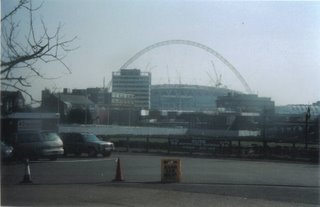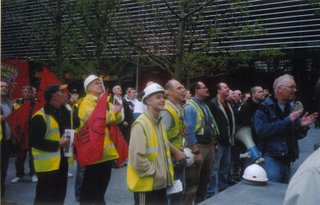"Remember the Dead, Fight for the Living"


WEMBLEY should have
memorial to Patrick O'Sullivan.
SOUTHWARK April 28, 2005. March paused to call site out to meeting.
AMONG pledges from which the Blair government has back-peddled is that of effective Corporate Manslaughter laws, promised when it took office in 1997.
According to the Hazards Campaign formed by various safety groups the government's Health and Safety Executive(HSE) is even moving away from enforcing existing law.
There are fewer workplace inspections, those that are made are less thorough, and the number of prosecutions dropped from 928 in 2003/4 to 712 in 2004/5.
HSE has admitted in the past to being understaffed, but the Hazards Campaign also blames a "business-friendly strategy" shifting towards company "self-regulation", and letting firms with bad records represent themselves as exemplary. It says regulations on working with deadly asbestos are even being relaxed, at the behest of landlords, insurance companies and some employers. Over 115 MPs have signed an Early Day Motion against these proposals.
Doubtless the government will claim it is spending more money on the service, but if so, where is it going? It's the same old story. Spending on safety related consultancies has increased from £19.9m in 2000/01 to £26.2m in 2004/5. A new Workplace Health Connect programme is seen as a pilot privatisation of HSE, taxpayer-funded but privately run. More "lifestyle" health promotion at work will exhort us to take better care of ourselves, while turning the focus away from work-related illness, stress and accidents.
This Friday, April 28, is Workers' Memorial Day. Started in Canada, it has become an international day to remember those whose unnecessary deaths at work often barely rate a mention by the media, let alone a headline. A time to demand justice and protection for the living.
The building trade is among the most dangerous - 73 deaths on Britain's building sites last year, 30 per cent of all reported deaths in the UK. The Construction Safety Campaign, formed by building trades' unionists often working with the families of fatal accident victims, is to the fore of campaigning for justice for them, and better safety laws; but also for union rights at work, so that workers are not afraid to speak out, but can organise and elect safety representatives to see that conditions are safe.
On April 28 we'll think of those hidden behind anonymous statistics, like carpenter John Robinson, who died in the next hospital bed to his son last week. The pair had fallen 12 storeys when scaffolding collapsed on the Jury's Inn hotel in Milton Keynes. Hundreds of fellow workers might have been injured if they had not been at lunch break when the fall happened.
We'll remember Patrick O'Sullivan, crushed to death on January 15, 2004 on the Wembley Stadium construction site. The site had seen several serious accidents before this. Two men had severe back and leg injuries when falling onto a working platform from height. Then last month, while comedians were making wisecracks about the delay in the stadium's opening some 3,000 workers had to be evacuated when a 50-tonne steel roof rafter moved and fell while being welded at the site.
On April 28, 2004 the Construction Safety Campaign marched to the stadium site, and workers walked off the job to attend the rally in honour of Patrick O'Sullivan. Among those addressing them was Pat's daughter, Margaret, who said:
I find it difficult to believe that I am standing here today talking to you with the utmost sadness about my father, Patrick O'Sullivan.
He was a man of great talent, wit and dedicated to his family.
On the 15th January, our lives changed beyond recognition when my father was killed here, at Wembley.
My mother became a widow at the age of 54 and John and I lost our father. How does it feel to lose someone so precious in such a horrific and unjust way? It seems almost impossible for me to convey the trauma and sense of loss my family has been enduring for the past 3 months.
My father arrived at work early on that Thursday morning, and before most people had even started their working day, my father had been killed.
I will never forget identifying his body...
Such a warm, vibrant, wonderful man reduced to a corpse.
Gone was everything we recognised, all the familiarities of our dad. Where we were so used to seeing a smile and hearing him laugh, we saw only a broken body that had been smashed; and the silence and stillness in the mortuary chapel emphasised we would never hear his voice again, never speak to him, never hold him.
I remember how cold he felt and the blood and dirt in his hair.
I remember when he was lying in his coffin - he still had that dirt of the building site engrained in his fingers. They just couldn't scrub it out.
His last rites were given whilst he lay in the mud at Wembley. The last words my father heard were 'Run, Patsy, run...!!!
What kind of terror & fear must he have felt?
No one should have to die like that - to be treated like fodder, just another payroll number to be struck from the list. Surely a man's life is worth more than that? It has to be.
People try to be kind and say, 'At least he didn't suffer, it was quick...' and that's supposed to be some sort of consolation to Mum, John and me. But the fact is, he was denied an old age, the chance to enjoy his retirement after working so hard all his life. But more so, he was denied a dignified and peaceful death surrounded by his family who loved him.
It was my mum and dad's birthday last month. They were the same age, born only a day apart. On dad's birthday we went to his grave. That day should have been a celebration of a man's life, not the marking of his death.
I had no real comprehension of the dangers he faced at work. He was a carpenter all his life, so too was his father and his father before that. It was a trade that was passed from father to son and he was proud of this tradition. You can see the buildings he helped build homes where families are now living, landmarks like Canary Wharf , Wimbledon...so many... and now Wembley. Yet all these landmarks were built on the sweat and blood of carpenters, scaffolders, labourers, and the hundreds and hundreds of men who work and suffer within this industry.
How many men have to die? How many fathers, sons, brothers must be maimed or killed before governments say enough is enough?
The level of complacency that exists within construction would never be tolerated in any other industry. And in this, the twenty-first century, men are injured and killed everyday on building sites around the country - most going unreported by the press. It takes a high profile site like Wembley to highlight the appalling safety record that these men are forced to endure.
It's too late for my dad.
His blood was spilt at Wembley and his blood is on the hands of those responsible for his death.
I had planned to go on the demonstration that day, but due to an unfortunate clash of circumstance found myself having to wait for and load a removal wagon that morning. I did go on the Workers Memorial Day march last year in Southwark and will be on it again on Friday.
Brent Trades Union Council has demanded that the Wembley national stadium should incorporate a permanent memorial to Patrick O'Sullivan.
Workers Memorial Day in London April 28 2006:
9am -10am protest at Canada House, Pall Mall East,Trafalgar Square, against the killer asbestos trade.
10.30 am Assemble Holland Street, by Tate Britain, SE1 for march 11.00am to HSE headquarters, Southwark Bridge Road, rally outside 11.30am..
12.15pm rally outside Greater London Authority,
south side of Tower Bridge, SE1.
More information, including events in other places:
http://www.hazardscampaign.org.uk/wmd/wmdactivities.htm
http://www.tuc.org.uk/h_and_s/tuc-11563-f0.cfm
Statesside:
http://www.aflcio.org/
http://www.uaw.org/solidarity/05/0405/feature05.cfm
And world-wide:
http://www.hazards.org/wmd/
Labels: safety

0 Comments:
Post a Comment
<< Home